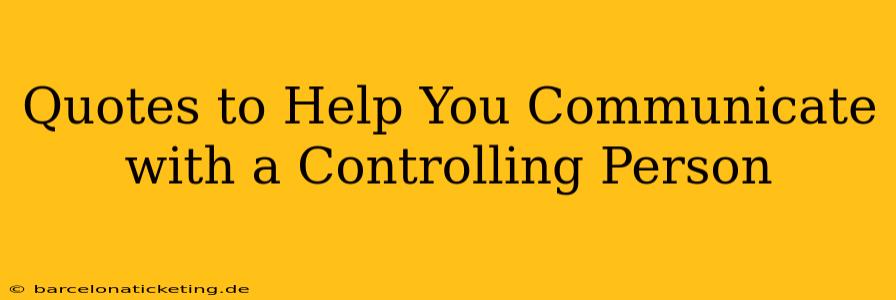Communicating with a controlling person can be incredibly challenging. Their behavior often stems from deep-seated insecurities or a need for power, making straightforward conversations difficult and potentially volatile. However, effective communication, even with difficult individuals, is possible. This isn't about winning an argument; it's about setting healthy boundaries and protecting your own well-being. This article offers carefully selected quotes and strategies to guide you through these tricky interactions. We'll explore how to use these quotes to navigate conversations, focusing on assertiveness and self-preservation.
Understanding the Dynamics of Control
Before diving into specific quotes, it's crucial to understand the underlying dynamics at play. Controlling behavior isn't about you personally; it's a reflection of the controller's own internal struggles. Recognizing this doesn't excuse their actions, but it can help you approach the situation with more empathy and less emotional reactivity. Remember, you are not responsible for their behavior, only your response to it.
Powerful Quotes to Use in Conversation
Here are some carefully chosen quotes that can help you navigate conversations with controlling individuals. Remember to deliver them calmly and assertively, focusing on your feelings and needs, not on blaming or accusing the other person.
-
"I understand your perspective, but I need to make my own decisions about this." This quote directly addresses the controlling behavior without confrontation. It acknowledges their viewpoint while firmly asserting your autonomy.
-
"I feel [emotion] when [behavior occurs]. Can we talk about this?" This uses "I" statements, a crucial technique in communication with difficult people. It focuses on your feelings and experiences, making it less likely to trigger defensiveness.
-
"My boundaries are important to me, and I need you to respect them." This quote clearly and directly sets a boundary. It's crucial to communicate your boundaries explicitly and consistently.
-
"I'm not arguing with you, I'm simply explaining my position." This differentiates between a disagreement and a power struggle. It can help de-escalate tense situations.
-
"I appreciate your concern, but I'm capable of handling this myself." This is useful for situations where the controlling person is attempting to micromanage. It assures them of your competence without becoming defensive.
-
"This conversation isn't productive. Let's take a break and revisit this later." Knowing when to disengage is key. If the conversation is becoming unproductive or escalating, it's okay to take a step back.
Frequently Asked Questions (FAQs)
Q: What if the controlling person doesn't respect my boundaries?
A: If your boundaries are consistently disregarded, you may need to take further steps, such as limiting contact, seeking support from friends and family, or even professional help. This is not a sign of failure; it's a recognition that you need to prioritize your well-being.
Q: How can I avoid getting into arguments with a controlling person?
A: Focus on "I" statements, avoid accusatory language, and set clear boundaries upfront. Choose your battles carefully and know when to disengage. Sometimes, the best approach is to simply agree to disagree.
Q: Is it possible to have a healthy relationship with a controlling person?
A: It's challenging, but not impossible. It requires consistent boundary setting, self-care, and potentially professional help for both parties. However, if the controlling behavior is severe or abusive, a healthy relationship is unlikely.
Q: What if the controlling person uses guilt or manipulation?
A: Recognize these tactics for what they are. Don't let guilt trips sway your decisions. Maintain your boundaries, and remind yourself that you're not responsible for their feelings.
Conclusion:
Communicating with a controlling person is a complex challenge requiring patience, assertiveness, and a strong sense of self. Remember, you have the right to your own opinions, feelings, and boundaries. The quotes provided here are tools to help you navigate these interactions with more confidence and protect your well-being. Prioritizing your mental health is paramount. If you're struggling, seeking professional support is a sign of strength, not weakness.

